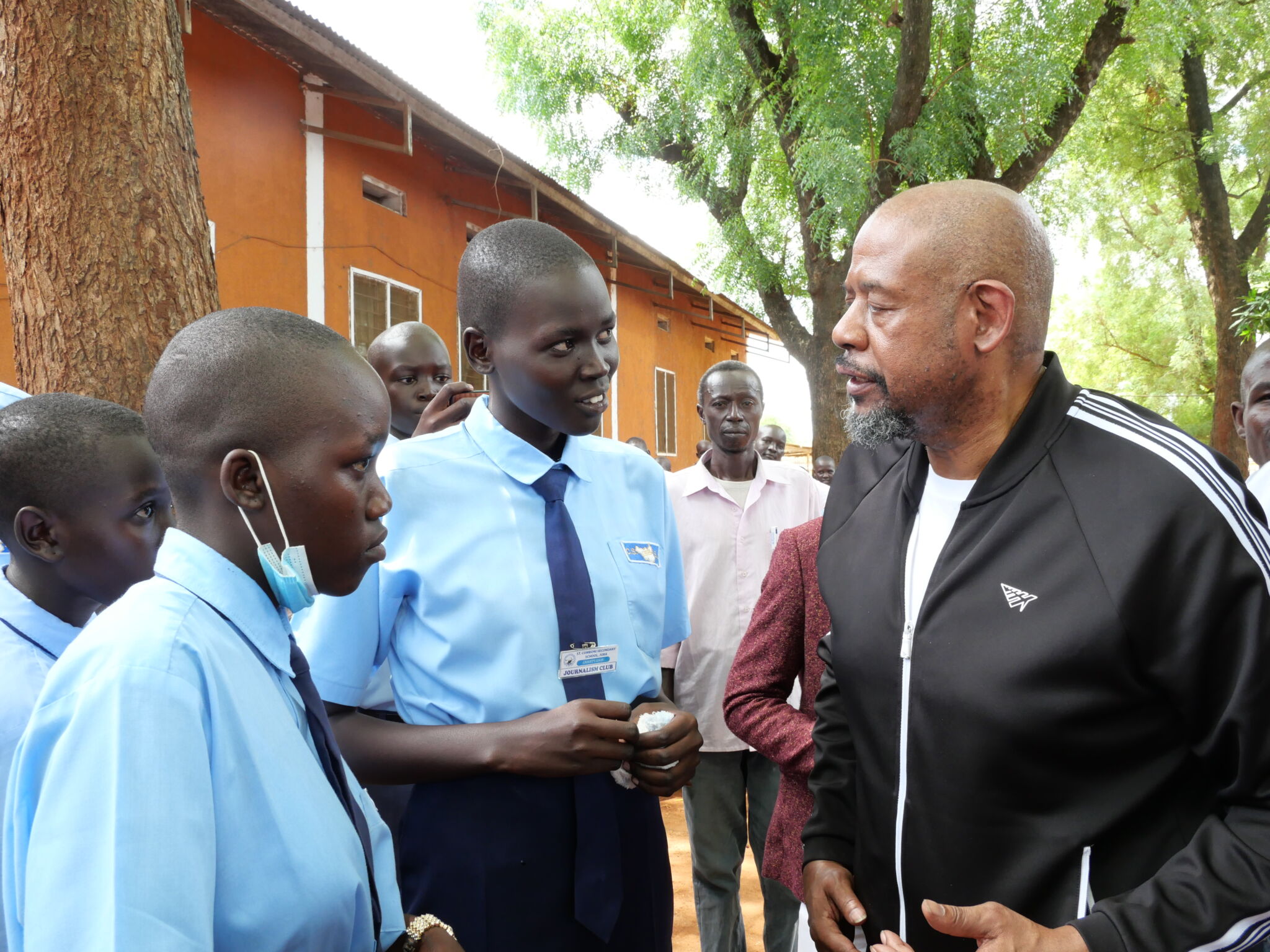A blog post by Forest Whitaker on World Refugee Day 2023

A few weeks ago, I traveled to Uganda and visited one of the most vibrant and fruitful programs that WPDI has on the ground, which is based at the Kiryandongo Refugee Settlement. The Settlement is home to more than 64,000 refugees, most of whom come from South Sudan. Many of them have lived there for years, if not decades. Some refugees were born there and go to school in or around the Settlement. I met with girls who participate in our scholarship program, and learned about their plans to continue their education in the years to come. I met with the group of young leaders that we have trained and now support as they develop peacebuilding and income-generating projects across the Settlement. I also connected with many other refugees: boys and girls, youths and adults alike, who had participated in WPDI’s programs in Kiryandongo — activities like enrolling in a training or a trauma workshop, launching a business, or simply attending a cultural event on tolerance or women’s rights.
Each refugee I met had a very unique story, a special situation that they wanted to share. But I was struck by a common feature in all these stories. These were, of course, stories of hardship and struggle. Yet, even more resonant were countless stories of hopes and dreams. I realized that far too often, we think of refugees as living lives that have been paused – as if, because they were forcibly moved, their lives come to a standstill, waiting for fate to press the “play” button. Nothing is further from the truth.
What is a refugee? A refugee is someone who is fleeing or fled an unsafe home, fearful of persecution or violence. A refugee transcends that label, though — each refugee is also a mother, a father, a son, a daughter, a brother, or a sister. A refugee contains a strong desire to live, love, and belong to a community. She or he has deep seeded dreams of a better life, full of laughter, permeated with peace. In countries where refugee crises seem overbearing, refugees may seem like lost spirits, with their humanity ebbing away. It is crucial to never forget that they are people: real people with real lives, with the potential for their lives to change.
I have seen this firsthand during my work at the helm of WPDI. Providing refugees with skills, resources, and opportunities can open new crossroads in the course of their lives. Many want to safely return to their homes, and we do hope that the brutal forces that interrupted their normal lives will abate. But until that occurs, life does not and cannot stop. Possibilities can be opened up for them. While individuals don’t contain the power to alter a country’s destiny, they can empower its citizens and foster conditions for a better life today — and hopefully – tomorrow.
I believe that what WPDI and other similar organizations do is vital, and should be emulated. We don’t merely seek to address the needs of refugees, we address their aspirations for better lives. That said, I recognize that the path to generalizing such approaches is long and ridden with obstacles, many of them of a purely political nature. Unfortunately, millions of refugees and displaced people around the world struggle to survive, let alone find time to really enjoy life. Leisure is a luxury, food is a scarcity, peace is a pipedream.
Today, UNHCR estimates that there are over 103 million displaced persons around the world, including 32.5 million refugees. They are fleeing war, conflict, persecution, natural disasters, economic and social insecurity. 72%, or over 7 in 10, come from just 5 countries: Syria, Ukraine, Venezuela, Afghanistan, and South Sudan. The civil war in Sudan has once again shaken regional stability, with an influx of refugees affecting neighboring countries like Chad, South Sudan, Egypt, Ethiopia, and the Central African Republic. Failing to gather additional funding (the UNHCR has stated that $445 million are needed to support the people displaced by the Sudan war until October) could have dire consequences, since each of these already overburdened countries will have smaller resources to allocate to the displaced that they host already, especially in South Sudan, which is still struggling to cope with its own displacement issue since civil war broke out over 10 years ago. WPDI has been working in collaboration with UN partners such as the United Nations’s multi-partner Reconciliation, Stabilization and Resilience Trust Fund (RSRTF) on peacebuilding projects in the country, as we fight to create better conditions for refugees.
This is a crisis for humanity, one that can only be overcome with real activism on an international scale. It requires collaboration among governments, private actors, and humanitarian organizations. Mostly, it requires a strong conviction that helping these people is important to humanity as a whole. That is because we live in a deeply globalized world, where conflicts in Africa can have a real knock-on effect in America, or where a civil war in Asia can have economic repercussions in Europe. But whatever a crisis’ particularities, the human experience remains at the heart of it.
We cannot abandon refugees to fate, especially when they have so much more to give, to the benefit of us all. Investing in refugees means investing in future global stability and regional peace. We have to help them realize their potential by adopting positive attitudes to their personal, human experiences. World Refugee Day reminds us that if we embrace the intrinsic power in every individual, no matter the dire circumstances that may be true of their current existence, there is hope within — even away from home.